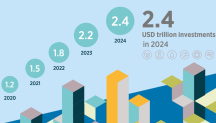.jpg?w=204&h=107&as=1&bc=ffffff&cc=1&hash=7F3A9409067192B23356B08607B747A0)
.jpg?w=201&h=105&as=1&bc=ffffff&cc=1&hash=003BED93CEC6F85C2E511C04F808E72C)
New policy brief on policy challenges for renewable energy deployment in the Pacific released
Newsletter
The brief addresses the conditions of renewable energy policy-making in Pacific Island Countries and Territories and proposes measures that could support the successful policy making and implementation.
IRENA’s brief on Policy Challenges for Renewable Energy Deployment in Pacific Island Countries and Territories (PICTs) addresses the conditions of renewable energy policy-making and proposes measures that could support the successful policy making and implementation. The analysis is based on two approaches: 1) findings of a survey that was circulated to energy professionals in PICTs to investigate the policy-making process for energy, and specifically renewable energy, the drivers and barriers to policy development, and policy implementation; 2) a review of the lessons learned from design and implementation of the Tonga Energy Roadmap (TERM), particularly on how to address challenges and overcome specific barriers.
Despite the region’s political commitment to renewable energy, deployment is a challenge. The paper recommends supporting renewable energy targets and national energy policies with clear and comprehensive policy roadmap and financial plan. It also emphasises the importance of empowering dedicated government entities to oversee the effectiveness of policy design and implementation and monitor the progress of achieving the national renewable energy target.
Another finding highlights the need to support data collection, analysis and dissemination for energy supply and calls for developing an asset-register database of renewable energy projects and infrastructure. This will guide policy-making and facilitate realistic planning. Therefore, increased financial resources and training are needed for statistics institutions.
To overcome competition between sectors for limited public funding, the paper recommends adopting clear priorities and promoting regional initiatives. In addition, innovative business cases could decrease the dependence on grants and promote self-financing schemes especially given the increasing energy bill of the PICTs and the decreasing costs of renewable energy technologies.
The paper concludes with a list of IRENA’s activities in the PICTs and underlines the importance of substantial involvement by governments, as well as collaboration with other stakeholders, to ensure accelerated renewable energy deployment.
The paper can be downloaded here.




